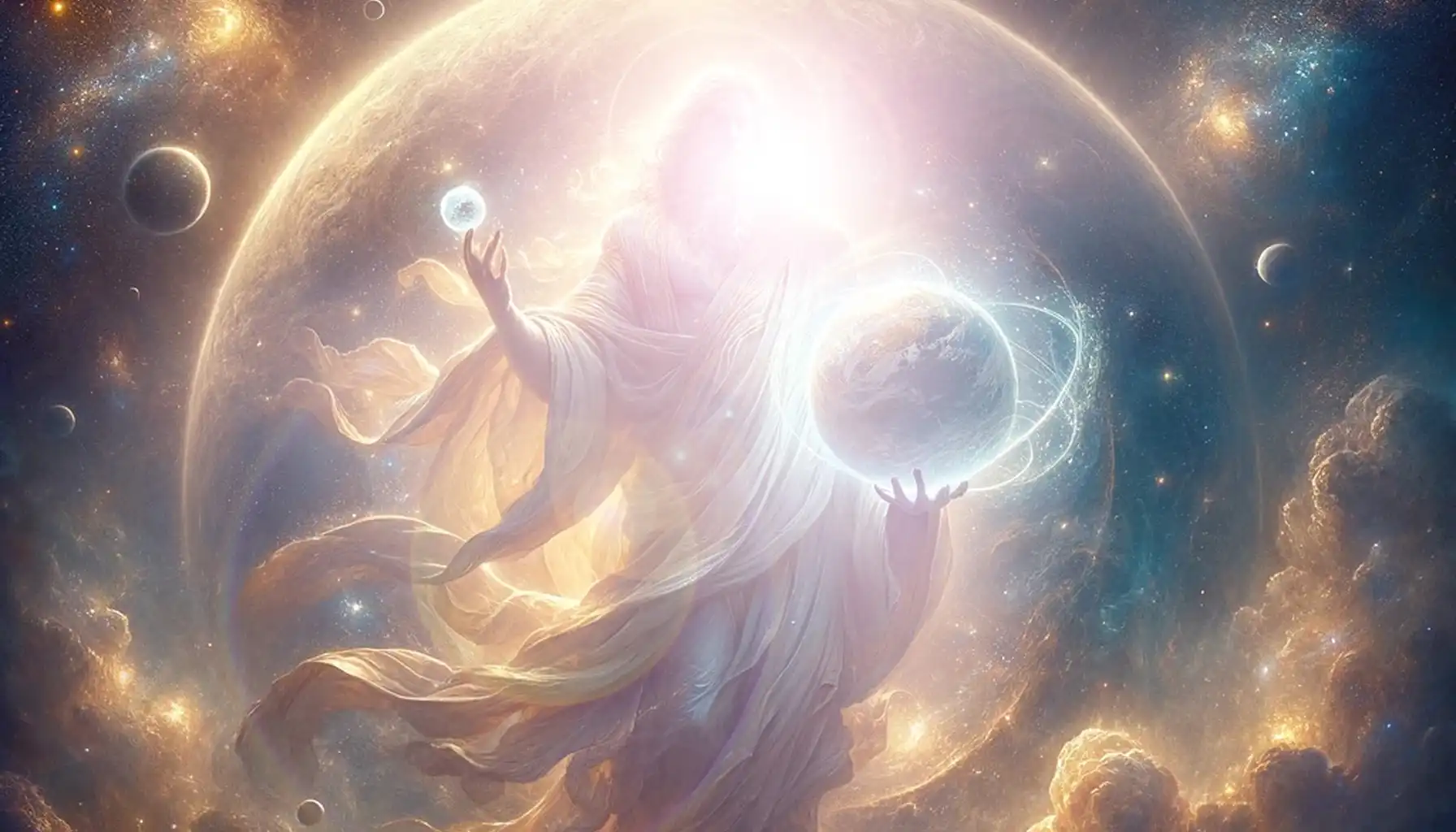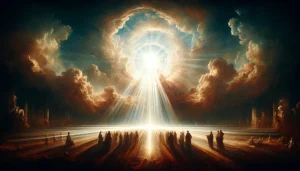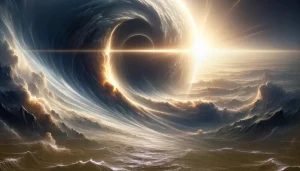Language
πάντα (All )πᾶς , collectively referring to “all” or “everything” (Note that the verb is singular). Followed by the negative statementοὐδὲ ἕν (“not even one”), it strategically emphasizes the universal dependence of creation on the Word.- Colossians 1:16, “For by him all [things] were created, in heaven and on earth, visible and invisible, whether thrones or dominions or rulers or authorities—all [things] were created
through him and for him.”
- Colossians 1:16, “For by him all [things] were created, in heaven and on earth, visible and invisible, whether thrones or dominions or rulers or authorities—all [things] were created
δι’ αὐτοῦ (through Him )διὰ can mean either “through” with genitive or “because of” with accusative. Sinceαὐτοῦ (him) is in the genitive case, the phrase means “through him,” indicating the means or agency by which these things came into being. The phrase echoes the Genesis 1 where God speaks creation into existence. John reinterprets this through the lens of the Word as the divine agent.- 1 Corinthians 8:6, “Yet for us there is only one God, the Father, from whom are all things, and we exist for Him; and one Lord, Jesus Christ, by whom are
all [things] , and we exist through Him.”
- 1 Corinthians 8:6, “Yet for us there is only one God, the Father, from whom are all things, and we exist for Him; and one Lord, Jesus Christ, by whom are
ἐγένετο (came into being )γίνομαι means the process of coming into existence, happening, being made, or becoming something. It appears three times in John 1:3: twice in the aorist tense (came into being) and once in the perfect tense (has come into being). While “came into being” highlights the process of existence arising, “was made” can emphasize the act of creation. (“Everything was made through Him, and without Him was not anything made that has been made.”). The 4th century Latin Bible (Vulgate) also used “made,” which influenced the KJV. The Septuagint (Greek OT used by Jesus and the Apostles) used “made” (ποιέω andἐγένετο ) to describe creation throughout Genesis 1.- John 1:14a, “And the Word became flesh and dwelt among us.”
- Isaiah 66:2, “All these things my hand has made, and so all these things came into being,” declares the Yahweh. “But this is the one to whom I will look: he who is humble and contrite in spirit and trembles at my word.”
χωρὶς αὐτοῦ (apart from Him )χωρὶς (apart from, without) with the genitive pronounαὐτοῦ (him) indicates a relationship of separation or absence. It’s not merely that the Word was absent and therefore no creation took place. Rather, the Word’s absence is the cause of the impossibility of creation and its ongoing existence. There’s a saying, “if you have Jesus, you have everything. If you don’t have Jesus, you have nothing.”- John 15:5, “I am the vine; you are the branches. Whoever abides in me and I in him, he it is that bears much fruit, for apart from me you can do nothing.”
οὐδὲ ἕν (not even one )οὐδὲ conveys a strong sense of absolute negation. It’s not simply “not one,” but “not even one,” leaving no room for exceptions.ἕν is an indefinite pronoun, meaning “one” or “any.” This combination creates a strong negation, indicating that not a single thing exists apart from the creative activity of the Logos.- John 3:27, “John replied, ‘A person can receive not even one [thing] unless it has been given to him from heaven.'”
ὃ γέγονεν (that has come into being )ὃ is a relative pronoun, meaning “that,” “which,” “who,” or “what.”γέγονεν is the perfect active indicative of the verbγίγνομαι (“to become” or “to come into being”). This tense carries the weight of completed action with lasting results. It signifies that creation is not a mere event in the past, but an ongoing state sustained by the Word and continuing in its existence.- 2 Corinthians 5:17, “Therefore, if anyone is in Christ, he is a new creation. The old has passed away; behold, the new has come.”
ὃ γέγονεν = v3 or v4?There is debate whether
ὃ γέγονεν belongs at the end of John 1:3 or the beginning of John 1:4, as the original Greek manuscripts have no punctuation. For example:“All things were made by him
| and without him was not any thing made| that was made| in him was life| and the life was the light of men.” (KJV)Bruce Metzger: “A majority of the Committee was impressed by the consensus of ante-NiceneBefore the First Council of Nicaea (325 AD) writers (orthodox and heretical alike) who took
ὃ γέγονεν with [John 1:4]. When however, in the fourth century Arians and the Macedonian heretics began to appeal to the passage to prove that the Holy Spirit is to be regarded as one of the created things, orthodox writers preferred to takeὃ γέγονεν with [John 1:3], thus removing the possibility of heretical use of the passage.” (A Textual Commentary on the Greek New Testament).
Insights
- He = Creator = God: This proves that He is God; for “He who built all things is God” (Hebrews 3:4). The God of Israel often proved Himself to be God by declaring that He made all things (Isaiah 40:12, 28; 41:4; Jeremiah 10:11-12).
- Worship Christ = Worship God: This proves the excellence of the Christian faith, as its author and founder is the same as the Creator of the world. How excellent must that institution be, which derives its foundation from Him who is the source of all excellence! When we worship Christ, we honor the Creator whom the patriarchs revered and upon whom all creatures depend.
- Our Savior = Our Creator: This shows how perfectly qualified He is for the work of our redemption and salvation. Help was laid upon one who is truly mighty, for it was laid upon Him who made all things; and He is appointed the author of our salvation, just as He is the author of our being.
Creator = GodAlbert Barnes: “There is no higher proof of omnipotence than the work of creation; and hence God often appeals to that work to prove that he is the true God, in opposition to idols. (cf. Isaiah 40:18-28; Jeremiah 10:3-16; Psalms 24:2; 39:11; Proverbs 3:19).
“It is absurd to say that God can invest a creature with omnipotence. If he can make a creature omnipotent, he can make him omniscient, and can in the same way make him omnipresent, and infinitely wise and good; that is, he can invest a creature with all his own attributes, or make another being like himself, or, which is the same thing, there could be two Gods, or as many Gods as he should choose to make. But this is absurd. The Being, therefore, that created all things must be divine; and as this work is ascribed to Jesus Christ, and as it is uniformly in the Scriptures declared to be the work of God, Jesus Christ is therefore equal with the Father.” (Barnes’ Notes on NT).
- The Word Is God
- “Having declared that the Word is God and having asserted his divine essence, John goes on to prove his divinity from his works.”
- Creation Through the Son
- “The evangelist’s purpose is to show that immediately after the creation of the world the Word of God was seen to be at work.”
- “Having previously been incomprehensible in his essence, he was then openly known by the effect of his power.”
- Philosophers’ View
- “Some philosophers say God is the Master-builder of the world in a way that makes [the Word] the intelligence behind the building of this work. In this they are right, for they agree with Scripture.”
Cross-References
- Proverbs 3:19, 8:30, “Yahweh by wisdom founded the earth; by understanding he established the heavens. […] Then I was beside Him, as a master workman; and I was His delight daily, rejoicing always before Him.”
- D. A. Carson: “Just as in Genesis, where everything that came into being did so because of God’s spoken word, and just as in Proverbs 3:19; 8:30, where Wisdom is the (personified) means by which all exists, so here: God’s Word, understood in the Prologue to be a personal agent, created everything.”
- Hebrews 1:2-3a, “But in these last days he has spoken to us by his Son, whom he appointed the heir of all things, through whom also he created the world. He is the radiance of the glory of God and the exact imprint of his nature, and he upholds the universe by the word of his power.”
- Hebrews 1:2-3a confirms that God made the world through His Son, Jesus Christ, who is not only the Creator but the Sustainer of all things. In John 1:3, “the change in tense from ‘were made’ to ‘has been made’ is then the change in reference from the act of creation to the state of creation” (D. A. Carson).
- Hebrews 11:3, “By faith we understand that the universe was created by the word of God, so that what is seen was not made out of things that are visible.”
- This verse highlights the necessity of faith to understand the divine act of creation. This complements John 1:3 by indicating that recognizing Christ’s role in creation is also an act of faith, who existed before all creation and is not visible in the same way as created things.
- Psalm 33:6, “By the word of Yahweh the heavens were made, and by the breath of his mouth all their host.”
- Matthew Henry: “God made the world by a word and Christ was the Word. By him, not as a subordinate instrument, but as a co-ordinate agent, God made the world (Hebrews 1:2), not as the workman cuts by his axe, but as the body sees by the eye.”
- John 5:17, “But Jesus answered them: My Father is working until now, and I am working.”
- Albert Barnes: “Christ was not merely called God, but he did the works of God, and therefore the name is used in its proper sense as implying supreme divinity. To this same test Jesus himself appealed as proving that he was divine.”
How God WorksThe Father, Son, and Holy Spirit each play distinct yet harmonious roles in “a single shared action.” All things come “from the Father,” “through the Son,” and “in the Holy Spirit.” (e.g., 1 Corinthians 8:6; John 1:3; Ephesians 2:18).
In creation, the Father decreed and initiated creation (Genesis 1:1), while the Son executed the Father’s will, creating all things (John 1:3; Colossians 1:16), and the Holy Spirit infused life, energizing and sustaining it (Genesis 1:2; Job 33:4).
In regeneration (new creation), the Father initiates salvation, electing and predestining believers (Ephesians 1:4-5), the Son accomplishes salvation through His life, death, and resurrection (Titus 3:5-6), and the Holy Spirit applies Christ’s work, regenerating, renewing, indwelling, sanctifying, and empowering them (John 3:5-6).
Tri-Perspectivalism
- Christ as the Creator – John 1:3 reveals the foundational truth that Jesus Christ, as the Word, is the Creator of all things. Scripture teaches that God created the world through His Word (cf. Genesis 1:3And God said, “Let there be light,” and there was light. (Genesis 1:3)), and John affirms that Jesus is the divine agent of creation. Everything that exists owes its existence to Him. Therefore, the normative truth is that Christ holds absolute authority over all creation, and all things serve His purposes (cf. Colossians 1:16-17For by him all things were created, in heaven and on earth, visible and invisible, whether thrones or dominions or rulers or authorities—all things were created through him and for him. And he is before all things, and in him all things hold together. (Colossians 1:16-17)).
- Jesus’ Sovereignty Over Creation – In the world we live in, people often deny the Creator and worship the creation instead (cf. Romans 1:25Because they exchanged the truth about God for a lie and worshiped and served the creature rather than the Creator, who is blessed forever! Amen. (Romans 1:25)). However, John 1:3 confronts our situation with the truth that Jesus is the source of all things. Whether we recognize it or not, all of creation reflects His glory and depends on Him for its continued existence. The church must proclaim Christ’s lordship over creation, calling the world to acknowledge His rule and give Him the glory due His name. In our day-to-day lives, this means recognizing Christ’s sovereignty over every aspect of our environment and circumstances.
- Finding Our Identity in Christ – Personally, John 1:3 challenges us to see our place in relation to Christ. Since He is the Creator, our very existence depends on Him. This realization should humble us and lead us to worship. Our identity is not found in ourselves or the things of this world but in Christ, the One who made us. We are His creation, made for His purposes. To live rightly, we must find our sense of purpose, value, and direction in our Creator, Jesus, who sustains our lives and directs our paths (cf. Acts 17:28For “In him we live and move and have our being”; as even some of your own poets have said, “For we are indeed his offspring.” (Acts 17:28)).




